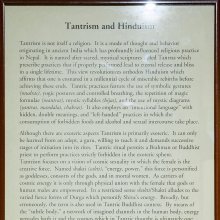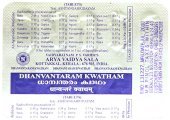Aguru: 21 definitions
Introduction:
Aguru means something in Hinduism, Sanskrit, Jainism, Prakrit, biology. If you want to know the exact meaning, history, etymology or English translation of this term then check out the descriptions on this page. Add your comment or reference to a book if you want to contribute to this summary article.
Images (photo gallery)
In Hinduism
Ayurveda (science of life)
Source: Google Books: Essentials of AyurvedaAguru (अगुरु).—The Sanskrit name for an important Ayurvedic drug.—The tree of Aguru grows in the north-eastern region of India. The fragrant substance is produced by insects whereby the wood becomes heavy. It tops the list of uṣṇavīrya-dravyas.

Āyurveda (आयुर्वेद, ayurveda) is a branch of Indian science dealing with medicine, herbalism, taxology, anatomy, surgery, alchemy and related topics. Traditional practice of Āyurveda in ancient India dates back to at least the first millenium BC. Literature is commonly written in Sanskrit using various poetic metres.
Purana and Itihasa (epic history)
Source: archive.org: Shiva Purana - English TranslationAguru (अगुरु) refers to the “fragrant Aloe wood”, which is used in the worship of Śiva, according to the Śivapurāṇa 2.1.13:—“[...] with the offering of Bilva leaves alone, the worship shall be performed. Then scented powders, sweetsmelling oil etc. of various sorts shall be offered to Śiva with great joy. Then incense, Guggulu (the fragrant gum resin) and Aguru (the fragrant Aloe wood) shall be offered”.
Source: Shodhganga: The saurapurana - a critical studyAguru (अगुरु) represents the food taken in the month Bhādrapada for the Anaṅgatrayodaśī-Vrata, according to the 10th century Saurapurāṇa: one of the various Upapurāṇas depicting Śaivism.—Accordingly, the Anaṅgatrayodaśī-vrata is observed in honour of Śiva for acquiring virtue, great fortune, wealth and for destruction of sins [...] This vrata is to be performed for a year from Mārgaśīra.—In the Bhādrapada, the tooth-brush is that of kadaṃba-wood. The food taken is aguru. The deity to be worshipped is Sadyojāta. The flowers used in worship are dhattūra. The naivedya offerings is śālibhakta. The result accrued equals all sacrifices.

The Purana (पुराण, purāṇas) refers to Sanskrit literature preserving ancient India’s vast cultural history, including historical legends, religious ceremonies, various arts and sciences. The eighteen mahapuranas total over 400,000 shlokas (metrical couplets) and date to at least several centuries BCE.
Shaktism (Shakta philosophy)
Source: Google Books: ManthanabhairavatantramAguru (अगुरु) refers to “aloe”, according to the Ṣaṭsāhasrasaṃhitā, an expansion of the Kubjikāmatatantra: the earliest popular and most authoritative Tantra of the Kubjikā cult.—Accordingly, “[...] One should make a level canopy [i.e., maṇḍapa] measuring sixteen (handspans) in a frightening forest, [...] O fair-faced one, one should then smear that place with the dung of a brown cow mixed with liquor. (The place) should abound with the fragrance of perfumed water and be fumigated with sandalwood and aloe [i.e., candana-aguru-dhūpita]. There, one should fashion twenty-four circles. One should fashion them in groups of six in the east, north, west, and south in the sequence in which worship takes place (of the sacred seats)”.

Shakta (शाक्त, śākta) or Shaktism (śāktism) represents a tradition of Hinduism where the Goddess (Devi) is revered and worshipped. Shakta literature includes a range of scriptures, including various Agamas and Tantras, although its roots may be traced back to the Vedas.
Shaivism (Shaiva philosophy)
Source: SOAS University of London: Protective Rites in the Netra TantraAguru (अगुरु) refers to “aloe wood” (used for smearing the earth), according to the Netratantra of Kṣemarāja: a Śaiva text from the 9th century in which Śiva (Bhairava) teaches Pārvatī topics such as metaphysics, cosmology, and soteriology.—Accordingly, [verse 2.17-19]—“The pure-souled Ācārya should draw an eight petaled lotus, in smooth, pure earth [that is] smeared with sandal and aloe wood (aguru—candanāgurucarcite) [and] scented [with] fragrant camphor and strong saffron. After he has drawn [the lotus] with a great undertaking, [the Ācarya,] decorated and adorned with a crown, smeared with sandalwood (aguru—candanāgurucarcitaḥ) , [writes] the mātṛkā. Having placed oṃ in the middle [on the pericarp of the lotus], he should draw [the phonemes of the mātṛkā on the petals] starting in the East”.

Shaiva (शैव, śaiva) or Shaivism (śaivism) represents a tradition of Hinduism worshiping Shiva as the supreme being. Closely related to Shaktism, Shaiva literature includes a range of scriptures, including Tantras, while the root of this tradition may be traced back to the ancient Vedas.
In Jainism
General definition (in Jainism)
Source: The University of Sydney: A study of the Twelve ReflectionsAguru (अगुरु) refers to “aloe wood”, according to the 11th century Jñānārṇava, a treatise on Jain Yoga in roughly 2200 Sanskrit verses composed by Śubhacandra.—Accordingly, “Whatever difficulties arise from life, they are each endured here by the embodied soul, only having taken hold of the body powerfully. The body of men also defiles auspicious things [such as] camphor, saffron, aloe wood (aguru), musk, sandalwood because of [its] contact [with them]”.

Jainism is an Indian religion of Dharma whose doctrine revolves around harmlessness (ahimsa) towards every living being. The two major branches (Digambara and Svetambara) of Jainism stimulate self-control (or, shramana, ‘self-reliance’) and spiritual development through a path of peace for the soul to progess to the ultimate goal.
Biology (plants and animals)
Source: Wisdom Library: Local Names of Plants and DrugsAguru [ಅಗುರು] in the Kannada language is the name of a plant identified with Aquilaria malaccensis Lam. from the Thymelaeaceae (Daphne) family having the following synonyms: Aquilaria moluccensis, Aquilaria secundaria, Aquilaria agallochum. For the possible medicinal usage of aguru, you can check this page for potential sources and references, although be aware that any some or none of the side-effects may not be mentioned here, wether they be harmful or beneficial to health.
Aguru [अगुरु, अगुरुः] in the Sanskrit language, ibid. previous identification.
Aguru in the Sanskrit language is the name of a plant identified with Dalbergia sissoo Roxb. ex DC. from the Fabaceae (Pea) family having the following synonyms: Dalbergia pendula, Pterocarpus sissoo.
Source: Google Books: CRC World Dictionary (Regional names)1) Aguru in India is the name of a plant defined with Aquilaria agallocha in various botanical sources. This page contains potential references in Ayurveda, modern medicine, and other folk traditions or local practices It has the synonym Aloexylum agallochum Lour. (among others).
2) Aguru is also identified with Dalbergia sissoo It has the synonym Amerimnon sissoo Kuntze (etc.).
Example references for further research on medicinal uses or toxicity (see latin names for full list):
· Annals of the Missouri Botanical Garden (1981)
· The Civil and Natural History of Jamaica (1756)
· Hortus Bengalensis, or ‘a Catalogue of the Plants Growing in the Hounourable East India Company's Botanical Garden at Calcutta’ (1814)
· Revisio Generum Plantarum (1891)
· Flora Indica; or, descriptions of Indian Plants (1832)
· Applied Entomology and Zoology (2008)
If you are looking for specific details regarding Aguru, for example pregnancy safety, side effects, diet and recipes, health benefits, chemical composition, extract dosage, have a look at these references.

This sections includes definitions from the five kingdoms of living things: Animals, Plants, Fungi, Protists and Monera. It will include both the official binomial nomenclature (scientific names usually in Latin) as well as regional spellings and variants.
Languages of India and abroad
Sanskrit dictionary
Source: DDSA: The practical Sanskrit-English dictionaryAguru (अगुरु).—a. [na. ta.]
1) Not heavy,light.
2) (In prosody) Short.
3) Having no teacher.
4) One different from a teacher.
-ru n. (m. also) [न गुरुर्यस्मात् (na gururyasmāt)]
1) The fragrant aloe wood and tree; Aquiluria Agallocha.
2) That which yields Bdellium, Amyris Agallocha.
3) The Śiśu tree (śiṃśapā).
Source: Cologne Digital Sanskrit Dictionaries: Edgerton Buddhist Hybrid Sanskrit DictionaryAguru (अगुरु).—(a-guru) (= Pali agaru), not offensive, not troublesome: yadi te aguru Avadāna-śataka i.94.3 (Pali sace te agaru); saced… asty aguru i.229.6 and 230.1, 9; saced…(gen. of person) aguru, ii.90.12, if you don't mind.
Source: Cologne Digital Sanskrit Dictionaries: Shabda-Sagara Sanskrit-English DictionaryAguru (अगुरु).—mn. (-ruḥ-ru) 1. A fragrant wood, aloe wood, or agallochum, (Aquilaria agallocha, Rox.) 2. Another tree which produces Bede llium, (Amyris agallocha.) 3. A timber tree, commonly Sisu, (Dalbergia sisu, Rox.) mfn. (-ruḥ-ruḥ-rū or -rvī-ru) Light, not heavy. E. a priv. and guru heavy.
Source: Cologne Digital Sanskrit Dictionaries: Benfey Sanskrit-English DictionaryAguru (अगुरु).—[a-guru]. I. adj. Short. Ii. n. Aloe wood (Aquilaria Agallocum Roxb. )
Source: Cologne Digital Sanskrit Dictionaries: Cappeller Sanskrit-English DictionaryAguru (अगुरु).—[adjective] not heavy; light, short (prosod.): [masculine] [neuter] aloe wood.
Source: Cologne Digital Sanskrit Dictionaries: Monier-Williams Sanskrit-English Dictionary1) Aguru (अगुरु):—[=a-guru] mfn. not heavy, light
2) [v.s. ...] (in prosody) short as a short vowel alone or before a single consonant
3) [v.s. ...] mn. the fragrant Aloe wood and tree, Aquilaria Agallocha.
Source: Cologne Digital Sanskrit Dictionaries: Goldstücker Sanskrit-English DictionaryAguru (अगुरु):—[tatpurusha compound] I. m. f. n.
(-ruḥ-ruḥ or rū or rvī-ru) 1) Not heavy, light.
2) Short (as a syllable). Ii. m. n.
(-ruḥ-ru) 1) A fragrant wood, aloe wood, or agallochum (Aquilaria agallocha, Rox.).
2) The balsam tree from which is produced Bdellium (Amyris agallocha).
3) A timber tree, commonly Sisū (Dalbergia sisu, Rox.). E. a neg. and guru.
Source: Cologne Digital Sanskrit Dictionaries: Yates Sanskrit-English DictionaryAguru (अगुरु):—[(ruḥ-ru)] 2. m. n. A fragrant wood.
Source: DDSA: Paia-sadda-mahannavo; a comprehensive Prakrit Hindi dictionary (S)Aguru (अगुरु) in the Sanskrit language is related to the Prakrit words: Aguru, Agurua.
[Sanskrit to German]
Sanskrit, also spelled संस्कृतम् (saṃskṛtam), is an ancient language of India commonly seen as the grandmother of the Indo-European language family (even English!). Closely allied with Prakrit and Pali, Sanskrit is more exhaustive in both grammar and terms and has the most extensive collection of literature in the world, greatly surpassing its sister-languages Greek and Latin.
Prakrit-English dictionary
Source: DDSA: Paia-sadda-mahannavo; a comprehensive Prakrit Hindi dictionaryAguru (अगुरु) in the Prakrit language is related to the Sanskrit word: Aguru.
Aguru has the following synonyms: Agurua.
Prakrit is an ancient language closely associated with both Pali and Sanskrit. Jain literature is often composed in this language or sub-dialects, such as the Agamas and their commentaries which are written in Ardhamagadhi and Maharashtri Prakrit. The earliest extant texts can be dated to as early as the 4th century BCE although core portions might be older.
Kannada-English dictionary
Source: Alar: Kannada-English corpusAguru (ಅಗುರು):—[noun] a small open water-craft moved by oars; a boat.
--- OR ---
Aguru (ಅಗುರು):—
1) [noun] the tree Aquilaria agallocha (Agallocham aloe) of Thymelaeaceae family.
2) [noun] the tree Commiphora agallocha (=Balsamodendrum roxburghii) of Burseraceae family; Indian bdellium.
3) [noun] the tree, Dysoxylum binectariferum, of Meliaceae family; white cedar.
4) [noun] the plant, Drosera burmanni, of Droseraceae family.
5) [noun] a fragrant substance made from the wood of Aquilaria agallocha.
6) [noun] a sweet or pleasant smell; fragrance.
--- OR ---
Aguru (ಅಗುರು):—
1) [adjective] not heavy; light.
2) [adjective] (pros.) (a syllable) not long; short.
--- OR ---
Aguru (ಅಗುರು):—[noun] (pros.) a syllable that is not long; a short syllable.
Kannada is a Dravidian language (as opposed to the Indo-European language family) mainly spoken in the southwestern region of India.
See also (Relevant definitions)
Starts with: Agurua, Agurucarcita, Agurudhupa, Aguruh, Agurulaghu, Agurulaghutva, Agurulahu, Agurulahua, Agurulepita, Aguruprayukta, Agurusara, Agurushimshapa, Agurushinshupa, Agurushumthi.
Ends with (+109): Acurakuru, Adhvaraguru, Ajaguru, Amaraguru, Ambalagacchanayakaguru, Ananyaguru, Annaguru, Anunaguru, Asaguru, Asheshaguru, Ashramaguru, Asuraguru, Avatarikaguru, Bhaishajyaguru, Bhavaguru, Bhuvanaguru, Buddhaguru, Candanaguru, Cantanakuru, Caracaraguru.
Full-text (+284): Agaru, Agurushimshapa, Agurava, Agnikashtha, Desika, Krishnaguru, Kalaguru, Dharmopadeshaka, Dahaguru, Dhupaguru, Guruvat, Gurutva, Gaurutalpika, Gandha, Gurvangana, Agurua, Parameshthin, Gurukilli, Laghunaman, Akkuru.
Relevant text
Search found 130 books and stories containing Aguru, A-guru; (plurals include: Agurus, gurus). You can also click to the full overview containing English textual excerpts. Below are direct links for the most relevant articles:
Cosmetics, Costumes and Ornaments in Ancient India (by Remadevi. O.)
1.8. Use of Aguru (Agallochum) < [Chapter 1 - Cosmetics]
1. Materials for Cosmetics (Introduction) < [Chapter 1 - Cosmetics]
3.6. Ornamental Painting < [Chapter 1 - Cosmetics]
Garga Samhita (English) (by Danavir Goswami)
Verse 4.19.57 < [Chapter 19 - A Thousand Names of Srī Yamunā]
Verse 2.21.39 < [Chapter 21 - The Rāsa-dance Pastime]
Verse 2.20.4 < [Chapter 20 - The Rāsa-dance Pastime]
Chaitanya Bhagavata (by Bhumipati Dāsa)
Verse 1.7.165 < [Chapter 7 - Śrī Viśvarūpa Takes Sannyāsa]
Verse 1.15.128 < [Chapter 15 - Marriage with Śrī Viṣṇupriyā]
Verse 1.15.84 < [Chapter 15 - Marriage with Śrī Viṣṇupriyā]
The Shiva Purana (by J. L. Shastri)
Chapter 33 - Rites for deriving benefits hereafter < [Section 7.2 - Vāyavīya-saṃhitā (2)]
Chapter 46 - The arrival of the bridegroom < [Section 2.3 - Rudra-saṃhitā (3): Pārvatī-khaṇḍa]
Chapter 52 - The bridegroom’s party is fed and Śiva retires to bed < [Section 2.3 - Rudra-saṃhitā (3): Pārvatī-khaṇḍa]
Bhajana-Rahasya (by Srila Bhaktivinoda Thakura Mahasaya)
Text 18 < [Chapter 3 - Tṛtīya-yāma-sādhana (Pūrvāhna-kālīya-bhajana–niṣṭhā-bhajana)]
Text 13 < [Chapter 2 - Dvitīya-yāma-sādhana (Prātaḥ-kālīya-bhajana)]
Text 37 < [Chapter 2 - Dvitīya-yāma-sādhana (Prātaḥ-kālīya-bhajana)]
Bhakti-rasamrta-sindhu (by Śrīla Rūpa Gosvāmī)
Verse 3.2.44 < [Part 2 - Affection and Service (dāsya-rasa)]
Verse 2.1.333 < [Part 1 - Ecstatic Excitants (vibhāva)]
Related products





